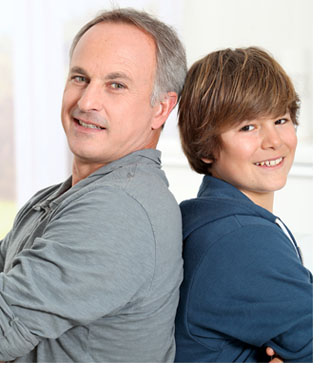
Argument with Dad? Find Friendly Ears to Talk It Out
June 06, 2014—With Father's Day approaching, San Francisco State University researchers have some advice for creating better harmony with dad. In a recent study, he found that when an adolescent is having an argument with their father and seeks out others for help, the response he or she receives is linked to well-being and father-child relationships.
Adolescents who receive a reason for the father's behavior or a better understanding of who is at fault feel better about themselves and about dad as well. Those feelings about dad, in turn, are linked to a lower risk of depression for youth.
The study is the first to explore the intricacies of what lead author Jeff Cookson, a professor and chair of the psychology department who has done extensive studies on fatherhood, calls "guided cognitive reframing." Previous research looked at who adolescents sought out for reframing and why; this study takes that research a step further. "There has been a lot of evidence suggesting that talking to people about conflict is a good thing for adolescents," he said. "What we did for the first time was look at what actually happens when they talk to someone."
Cookston and his colleagues surveyed 392 families about adolescents' conflicts with their co-resident fathers and stepfathers. Parents and children were asked who was sought out for support and how frequently; how often those individuals explained the fathers' behavior or blamed the fathers for the conflict; and how the adolescents felt about themselves and their fathers after the reframing.
Mothers were the most sought-out source for reframing, followed by a non-parental figure—a friend, for example, or a non-parental family member. Next were biological fathers and, lastly, stepfathers. But how often adolescents seek out a specific source for support does not have an impact on their well-being, the study showed. Instead, it is the quality of the reframing—whether an explanation is provided for dad's behavior or whether responsibility for the conflict is assigned—that drives how they feel following the conversation.
"When kids get explanations and good reasons that fit with the world they see, it helps them feel better," Cookston said. "It's sometimes hard to change how adolescents feel about situations, but we can talk to them about how they think about those situations."
Half the families surveyed consisted of co-resident biological fathers and half were co-resident stepfathers. In addition, the survey group was split between families of European descent and families of Mexican descent. But despite those variations in the families, the results were overwhelmingly similar.
The study highlights the value of helping adolescents understand conflict, their role in the family and their relationships, according to Cookston. "Adolescence is a time of physiological changes in the brain and in the way a child sees and interprets the world. We can use this time to help them understand personal relationships the same way we expect them to learn and understand, for example, geometry or algebra," he said. "Families are happier when they have less negative emotions, so anything we can do to promote more positive or even more neutral emotions within family is desirable."
Cookston's research comes as there is increasing attention on fathers who find themselves in transitional roles in today's economy. The Pew Research Center recently reported compelling new information on stay-at-home dads, and while such particulars aren't part of the study, it's another component affecting fatherhood and the relationships with children.
Cookston has conducted wide-ranging research on parenting and fatherhood, with a focus on how children from diverse backgrounds respond to parenting, and how children perceive and construct relationships with fathers. His research has shown that the relationship between father and child can have a significant impact on the child's tendencies toward depression and behavior problems.
JONATHAN MORALES
ARTICLE:
"He said what? Guided cognitive reframing about the co-resident father/stepfather–adolescent relationship," Jeff Cookston, Andres Olide, Ross D. Parke, William V. Fabricius, Delia S. Saenz and Sanford L. Braver. Journal of Research on Adolescence, March 2014.
